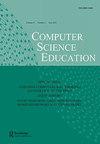社会互动和实践积极影响女性在计算机科学专业的保留率
IF 2.2
Q1 EDUCATION & EDUCATIONAL RESEARCH
引用次数: 0
摘要
摘要背景和背景尽管在扩大参与方面进行了30多年的研究,但女性在计算机科学教育中的代表性仍然不足。虽然CS专业的入学人数有所增加,但在美国,女性获得的CS学士学位仅占18%。本研究从坚持CS专业的女性的角度探讨了支持保留的因素(即社会互动和实践)。方法我们首先对10名参与者进行访谈,将他们分为两个焦点小组,然后进行个人深入访谈。研究结果我们确定了四种支持留住女性的社会互动类型。在实践方面,我们介绍了四种最常见的实践,以及四种将女性保留在边缘的实践。这些发现通过外围合法参与实践社区的理论视角,增加了对支持留住妇女的因素的细微理解。影响这项研究对CS部门如何支持留住女性有几个影响,例如通过支持实习、宣传工作与生活的平衡以及培训教师和学生合法性和支持的重要性。本文章由计算机程序翻译,如有差异,请以英文原文为准。
Social interactions and practices that positively influenced women’s retention in their computer science major
ABSTRACT Background and Context Despite over 30 years of research on broadening participation, women are still underrepresented in Computer Science (CS) education. While enrolment in CS majors has increased, women earn only 18% of the CS baccalaureate degrees in the US. Objective Most research focuses on why women leave CS. This study explores factors (i.e. social interactions and practices) that support retention from the perspective of women who persisted in their CS major. Methods We interviewed ten participants first by separating them in two focus groups and then by using individual in-depth interviews. Findings We identified four types of social interactions that support retention of women. In terms of practices, we present four of the most frequent practices, and four practices that characterised retention of women at the periphery. These findings add nuanced understanding of factors that support retention of women through the theoretical lens of legitimate peripheral participation in communities of practice. Implications This study has several implications for CS departments on how they can support women’s retention, such as by supporting internships, propagating work-life balance and training faculty and students on the importance of legitimacy and support.
求助全文
通过发布文献求助,成功后即可免费获取论文全文。
去求助
来源期刊

Computer Science Education
EDUCATION & EDUCATIONAL RESEARCH-
CiteScore
6.90
自引率
3.70%
发文量
23
期刊介绍:
Computer Science Education publishes high-quality papers with a specific focus on teaching and learning within the computing discipline. The journal seeks novel contributions that are accessible and of interest to researchers and practitioners alike. We invite work with learners of all ages and across both classroom and out-of-classroom learning contexts.
 求助内容:
求助内容: 应助结果提醒方式:
应助结果提醒方式:


